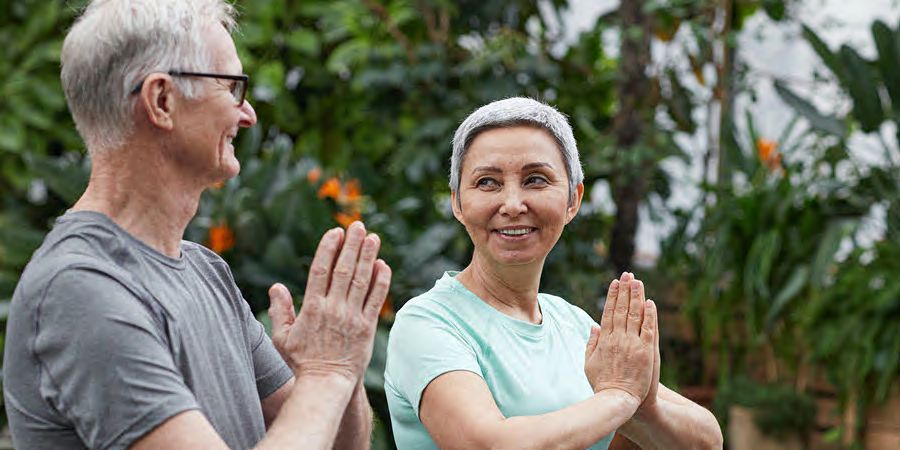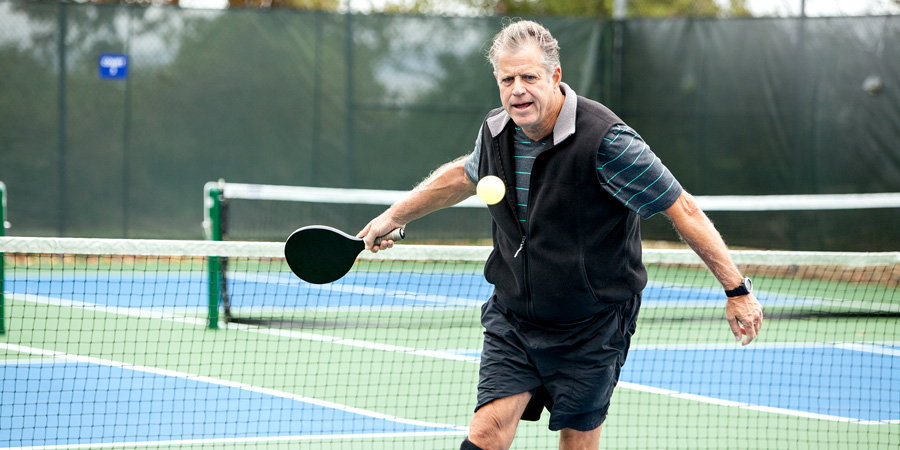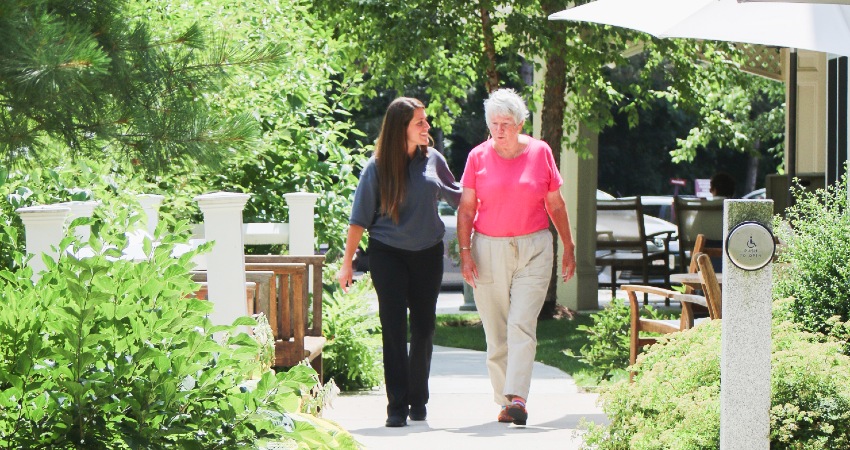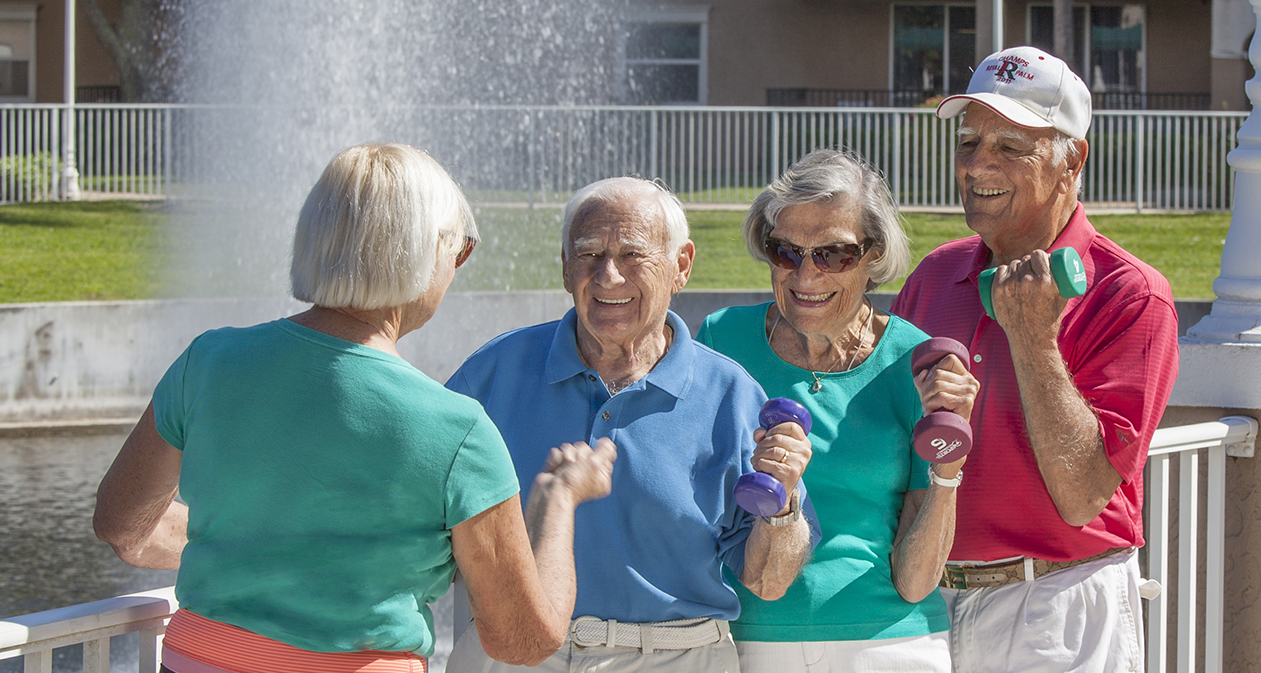This Blockbuster “Drug” Defies Aging
April 26, 2021
Senior Exercise Is Medicine for Your Body—and Soul
It’s hard to admit sometimes, but as we age, so do our bodies. Loss of muscle tone, bone density and tissue elasticity along with weight gain can make what experts call your “biological age” feel older than your chronological age—when what you really want is to feel younger than your years. No wonder the internet is awash in miracle cures for aging, from unregulated natural supplements to expensive anti-wrinkle creams.
But what if there were a drug all the experts agreed on, one proven to help you lose weight, build strength and agility, ease gastro symptoms, improve your sleep, prevent disease, reduce stress, lift your mood—even enhance your sexual health? You’d probably want a daily dose of this drug, wouldn’t you? Well, good news. Not only are you eligible for this prescription, it’s available to you right now! You know it by its generic name: exercise.
Moving is medicine for seniors – and everyone!
Physical activity of just about any kind can add not only years to your life, but life to your years. In fact, so numerous are its benefits that if exercise were a pill, it would be flying off the pharmacy shelves. Especially for older adults, it’s nothing short of a miracle cure. Senior exercise is known to provide a host of health benefits, including maintaining a healthy weight, reducing risk of heart disease and diabetes complications, promoting bone, joint and muscle health, preventing constipation, sharpening memory and thinking skills and promoting sexual health.
All well and good, but what if you’ve never had much success sticking to an exercise routine? Here’s a tip: Try thinking of senior exercises as a medicine to take versus something one has to do. It can help motivate you to get that daily dose—and shake off any guilty feelings when you don’t. Unlike some prescriptions, missing a dose of this drug is not a big deal. The point is to keep reaching for it.
There are some important similarities between senior exercise and medication when it comes to improving your health. For example, either works best when individualized. As with a drug, each exercise “prescription’ should vary depending on type, duration, intensity, and frequency. Second, each person benefits from knowing which senior exercise type and routine may work best for them; consulting a trainer or taking a class can provide this kind of guidance. This is why the certified fitness experts at Ageility, for example, insist on an upfront assessment to evaluate an individual’s current health profile and abilities as well as their goals—what their own personal “cure” would look like.
Medicine for body and mind
In addition to what it does for physical health, senior exercise offers multiple benefits that help overall cognitive function. When your mind is stressed, it sends a message to many different nerve connections that cause your body to feel depleted. Conversely, healing your body—say, through exercise—will help heal your mind as well. Exercise helps your body produce endorphins that decrease depression, lower levels of stress hormones such as cortisol, and boost self-esteem. Release of endorphins also promotes weight loss and improves sleep. Exercise also increases your body’s production of antibodies and T-cells that fight infection, improving your immune system and protecting you against illness. This has a bonus effect, as feeling resilient against disease can also help improve your mental wellbeing.
Ready to take your medicine? To ease into exercise, here are three gentler types you can do almost anytime, anywhere:
Cardiovascular and aerobic exercise for seniors
Walking is aerobic exercise with cardiovascular benefits—and one of the easiest exercises to perform. It doesn’t require a gym or any equipment; just put on comfortable footwear and go! It’s a great way to relieve stress, whether you are power walking or strolling at a steady pace and clearing your mind. The American College of Sports Medicine and the Centers for Disease Control and Prevention “prescribe” at least 150 minutes per week of moderate intensity aerobic activity, 75 minutes of vigorous aerobic activity, or a combination of both. Brisk walking qualifies as moderate intensity activity, but any pace can be beneficial.
Tai chi for seniors
If you’ve ever passed a crowd of people standing in rows out on a lawn, all moving gently through a series of poses, you’ve seen tai chi. A traditional Chinese practice, tai chi is an exercise routine anyone can do: The movements are easy, slow, and repetitive, focusing on the form of each movement and breathing. Tai chi is known to benefit people who suffer from anxiety, stress and depression. It also regulates immune functions by increasing endorphin levels. For older adults wishing to undo years of work-related stress, tai chi can alleviate any energy blockages within the body, promoting a sense of inner peace and mindfulness.
Pilates for seniors
Pilates is a method of putting low impact and stress on the body to help improve postural alignment, core strength, and balance by relaxing overactive muscles and activate underactive ones. It’s a great way to release anxiety and stress to manage cortisol levels. Pilates helps promote strength, flexibility, posture, and weight loss. Similar to yoga, focusing on your breathing in Pilates helps improve the flow of oxygen to all of your body’s cells and removes wastes and toxins being trapped by insufficient blood supply.
As a bonus, Pilates also helps you manage stress by decreasing cortisol levels and increasing levels of endorphins and serotonin, a neurotransmitter that helps regulate mood and many other physiological processes, improving your mood naturally.
Ready, set …
Now that you know about this wonder drug, why not give exercise a try? Or, if you already exercise, try adding variety to your routine with something new. Research shows that mixing things up can help you stay with your exercise prescription longer. It’s good medicine. Take it—for life.
Ageility offers highly personalized fitness training by certified fitness professionals. Find out if there’s an Ageility clinic near you.




